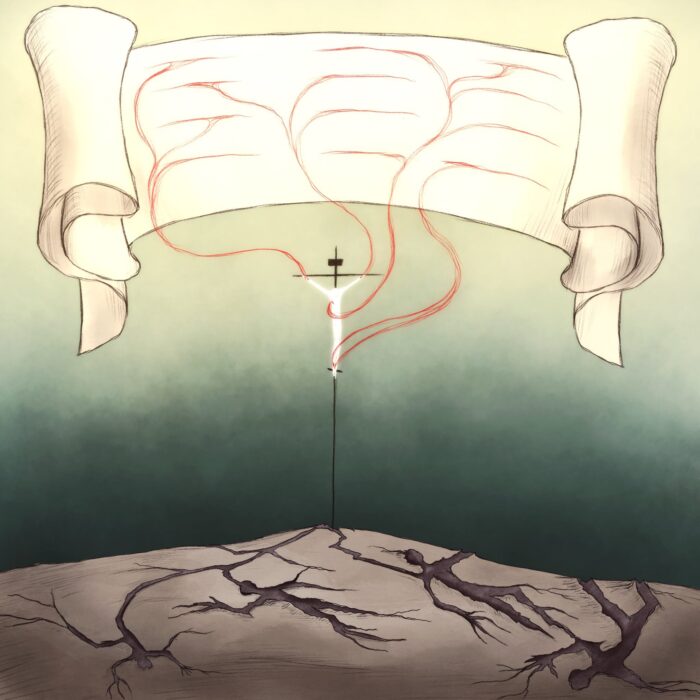
Luke 5:20, “…when He saw their faith, He said, ‘Man, your sins are forgiven you.’”
Luke 5:20, 7:9, 7:50, 8:48, 17:19, 18:42,
These six passages from Luke’s gospel all share the same dynamic, namely, Jesus acknowledging the faith of someone who has come to Him and—in explicit response to that faith—His “saving” or “healing” or “forgiving” them. I pause here this morning because I’d like to see what insight these six verses might give into the nature of faith as Jesus sees it (which is really all that matters).
One theme that rises immediately to the surface is a kind of hopeful desperation that casts oneself wholly on Christ; something of an enactment of Peter’s words in John 6:68, “to whom [else] shall we go?” In each of these instances, faith moves a person to desperately seek Jesus out as the only solid ground in a world of shifting sand, as the only refuge in the midst of a hurricane of opposition, as the only rock in the midst of tumultuous circumstances.
In 5:20 faith is tearing through the ceiling to get to Christ, in 7:9 it is recognizing that even His spoken word of authority is enough, in 7:50 it is the lavish, tear-filled response of a heart that has found the fountain of forgiveness beyond all hope or expectation, in 8:48 it is the desperate conviction that even touching the hem of His garment will do what no human power can, in 17:19 it is obedience to Christ as Master and gratitude to Him as Lord, and in 18:42 it is a stubborn importunity that cries out to Jesus as the sole source of mercy, refusing to be silenced. Varied expressions, but beating at the heart of each is the conviction that this one and this one alone can help me….There is nowhere else to go, there is no one else to seek, it is JESUS or it is nothing….it is JESUS or it is death, despair, disease and damnation.
What is saving, healing, forgiveness-receiving faith? At the very least we can say that such faith comes with nothing to Christ as all…..such faith comes starving to Christ as the Banquet….it comes broken to Christ as the Healer….it comes filthy to Christ as the Purifier….it comes despairing to Christ as Life, Light, and Hope.
And, though it is not explicit in these texts, it becomes clear as the canon continues to unfold—Christ is this object of faith because He is God incarnate. Yes, such faith as that described above is due only to God, only to YHWH, and it is therefore due to Christ since He is God in the flesh. In fact, now that the Son has taken on flesh and dwelt in our midst, there is no such thing as faith in “God” that is not faith in the incarnate God….there is no such thing as coming to God, trusting in God, depending on God unless by “God” we mean the Father who sent and is definitively revealed (by the working of His Spirit) in the incarnate Son.
A further implication of this same truth is that, not only does “faith in God” mean “faith in Jesus,” but it means “faith in the crucified and risen Jesus.” The Christ to whom we come, the Lord upon whom we cast ourselves in the desperate dependence of saving faith, the one who is the object of our whole-souled embrace must be not merely God and not merely Jesus, but God as He is for us in the Jesus who is crucified, buried, and raised again to life. Only in this is God savingly revealed (1 Cor.1:21-24), only in this is the One True God presented to us so that we might—as the six cases outlined above—so that we might lay hold of Him with desperate and hope-filled dependence.
Why is this so? For at least two reasons.
First, Jesus becomes the one who forgives our sins and heals our diseases and lifts our lives from the pit and rolls back the horrors of the curse only and precisely because He Himself bears our sins and receives our diseases and descends into the pit and becomes the curse for us on the cross….and in doing so, redeems us from these things (Gal.3:13). He heals what He becomes, therefore He becomes all horrors and maladies on Calvary so that, with His resurrection, He might be the universal savior.
But secondly, the crucified and risen Christ is the object of our faith because only by this great act of redemption is the God in whom we trust finally and fully revealed to us. We do not know God unless we know Him as the one revealed at the cross (John 1:18, 14:9; 1 John 5:20, etc), and faith is about knowing God so as to cast ourselves wholly upon Him. It is about knowing and receiving and enjoying the One for whom we exist…..and that cannot happen until He has declared Himself from Calvary.
So…..may we come to Christ like the paralytic, like the centurion, like the sinful woman, like the woman with the flow of blood, like the grateful leper, and like the blind man…..may we come with desperation and hope, with whole-souled abandon and whole-souled reception to the only begotten Son of the Father, to the One in whom and as whom God is wholly and unreservedly FOR US.




